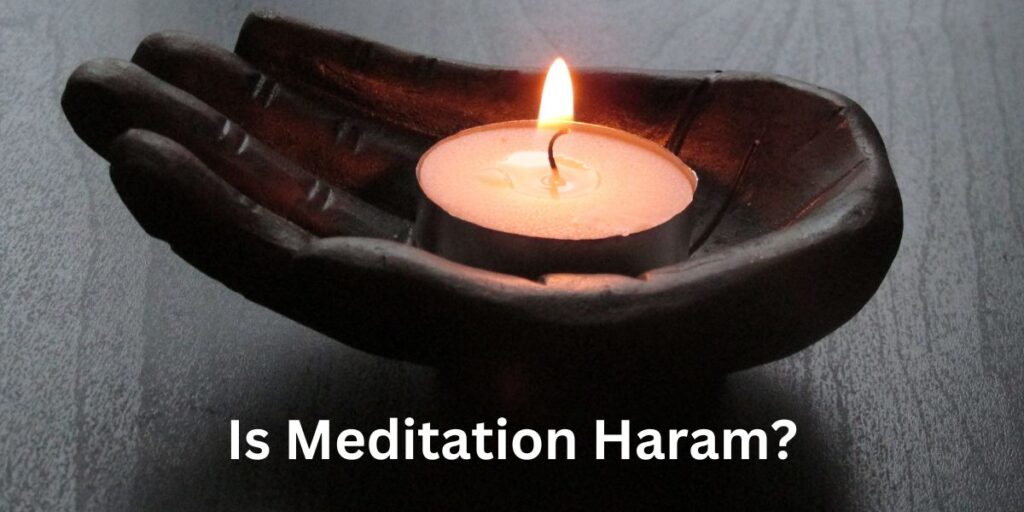Meditation has been a crucial spiritual practice for many centuries. Islamic scholars debate whether it is Halal or Haram, focusing on intent. If meditation helps connect with God or Allah and respects Islamic beliefs of prayer and worship, it is typically seen as permissible. However, any meditation practice conflicting with these beliefs might be considered Haram. Such views are accepted by many religions, showing a shared respect for the purity of spiritual intentions.
Is Meditation Haram?
No, according to Islamic teachings, meditation is not haram. Many see it as strengthening their faith and relationship with God. Meditation helps focus on Allah, bringing peace of mind, calm, and inner peace.

Reflection on Allah’s wonders and creation through meditation can deepen understanding of the Quran. Prophet Muhammad, peace be upon him, taught the value of contemplative remembrance or dhikr, which can improve insight and support sound decisions in faith.
Is Meditation Haram in Islam?
Meditation and Islam seem complex together. Islamic scholars give different advice. Islamqa websites say meditation is not haram if it follows Islamic guidelines. Mindfulness and meditation help Muslims better follow religious beliefs. Islamic teachings often encourage practices like dhikr. These methods are permissible and can fit well within an Islamic framework. This approach helped me include meditation in my daily routine without conflicting with my faith.
What is Meditation in Islam?
Meditation in Islam involves spiritual practice through dhikr, where words or phrases are repeated to strengthen the connection with Allah. This form helps Muslims find inner peace, reduce stress, and improve concentration. Since the focus is on God, prayer, and worship, many Islamic scholars see it as Halal if aligned with Islamic beliefs. Misalignment or opposing practices might be considered Haram.
“Meditation is not a retreat from the world but a way to connect more deeply with it.” – Anonymous.
- Faith and love in actions help serve humanity and show devotion to God.
- Repetition of Zikr enhances spiritual focus and promotes better sleep habits.
- A solid spiritual practice helps strengthen relationships with family members and friends.
- Intent matters; it guides whether the act of meditation is Halal or Haram in Islam.
Is Meditation Haram Reddit
Meditation often stirs debate among Muslims on Reddit about whether it is haram or acceptable in Islam. Many believe meditation helps with relaxation and improves overall mental health and well-being, so it fits well within Islamic traditions without elements against religious beliefs. Various sources and evidence suggest that spiritual practice, commonly adopted across different religions, can be beneficial for anyone, including Muslims, provided it aligns with their faith.
Is Meditation Sunnah
Meditation in Islam involves Dhikr, mindfulness, silent prayer, and Quran recitation. These practices help Muslims connect with Allah, deepen their faith, and improve mental health. Prophet Muhammad, peace be upon him, encouraged such activities for their spiritual benefit.
Islamic teachings see these forms of meditation as ways to reflect and contemplate. They do not replace or override other requirements like salah (prayer). For many, these practices are important for growing their relationship with their spirituality and understanding of Islam.
How Did Prophet Muhammad Meditate?
Prophet Muhammad often used meditative techniques to stay calm in tough times. He favored long walks and deep breaths to sharpen his focus and align his intentions. His practice included dhikr, a Sufi method where repeating words and phrases dedicated to Allah helped him feel spiritually connected and closer to God.
“Through the remembrance of Allah, hearts find peace.” – Prophet Muhammad.
Additionally, he advised his followers to cherish solitude and engage in prayerful contemplation, a form of meditation believed to bring peace of mind. This guidance shows that various types of meditation are not only allowed but recommended for personal growth and handling life’s difficulties effectively.
What Does Islam Say About Mindfulness?
Islam strongly emphasizes mindfulness as a key component of spiritual life. Mindfulness in Islamic teachings means being fully aware of our actions, thoughts, and the environment, fostering a closer relationship with Allah. It involves reflection, gratitude, and awareness of Allah’s blessings, helping Muslims live a more focused and purposeful life under God’s will.
“Mindfulness is the heart of prayer, the life of patience, and the spirit of all knowledge.” – An Islamic Scholar.
Mindful Practices in Islam
- Prayer—regularly connects with Allah, enhancing spiritual focus.
- Meditation—deepens understanding of self and strengthens connection with God.
- Gratitude—daily recognition of Allah’s blessings increases positivity and contentment.
- Reflection—regular introspection to align actions with Islamic principles.
- Awareness—constant vigilance over thoughts and deeds to uphold integrity and faith.
Meditation & The Remembrance of Allah
Meditation in Islam is more than just sitting quietly; it connects deeply with dhikr, the meditative remembrance of God. Unlike formal obligatory ritual prayer, dhikr targets the inner spiritual essence, which Prophet Muhammad (PBUH) showed by meditating in the Cave of Hira during his first revelation. This form of meditation can be a source of real contentment and mental tranquility, establishing a spiritual bedrock for Muslims.
Balance of Inner and Outer Worlds
Meditation helps maintain a balance between our inner and outer worlds. By focusing on spiritual development, Muslims can better fulfill their roles as representatives of God on earth.
Contemplation and Action in Islam
Contemplation of God through meditation strengthens the foundation of daily actions. This meditative practice ensures that Muslims stay true to Islam’s ideals, regulating life’s affairs in a way that God desires.
Conclusion
Meditation in Islam often focuses on self-reflection and contemplation. Many Islamic scholars debate whether it is haram or permissible. Typically, it is seen as beneficial when it helps improve focus and relaxation within the guidelines of Islamic teachings. For individual Muslims who use meditation to feel closer to God, it is considered permissible and not haram. This practice can enhance a Muslim’s spiritual journey by fostering a deeper self-reflection.
Frequently Asked Question(s)
Is it a sin to meditate?
Meditation on God’s Word helps many feel closer to their faith. It is encouraged in Scripture and is not considered a sin like lying, adultery, murder, or pride. Rather, it promotes kindness and love toward one’s neighbor, even turning the other cheek when faced with conflict.
How to meditate according to Islam?
Meditation in Islam embraces practices like Dhikr, remembrance of God, and muraqaba, which are deep contemplations. Followers use these methods to foster a sense of presence with the divine. Sama’, which involves music and motion, brings about an ecstatic experience of listening and connecting. These traditions, rooted in the Qur’an, guide believers to a closer relationship with their spirituality.
Is yoga allowed in Islam?
Many Muslims find yoga valuable for health and relaxation. However, these activities should not replace essential religious duties, like prayer or fasting. While the “sun salutation” or Surya namaskar goes against Islamic law, other aspects of yoga that focus purely on physical health are generally acceptable.
How do you control the mind in Islam?
Controlling the mind in Islam means avoiding negative thoughts about the past and future and embracing positive thinking. This helps reduce stress, boost self-esteem, and calm the mind. Focusing on the present and tackling tasks without procrastination makes followers feel better and more spiritually aligned.






